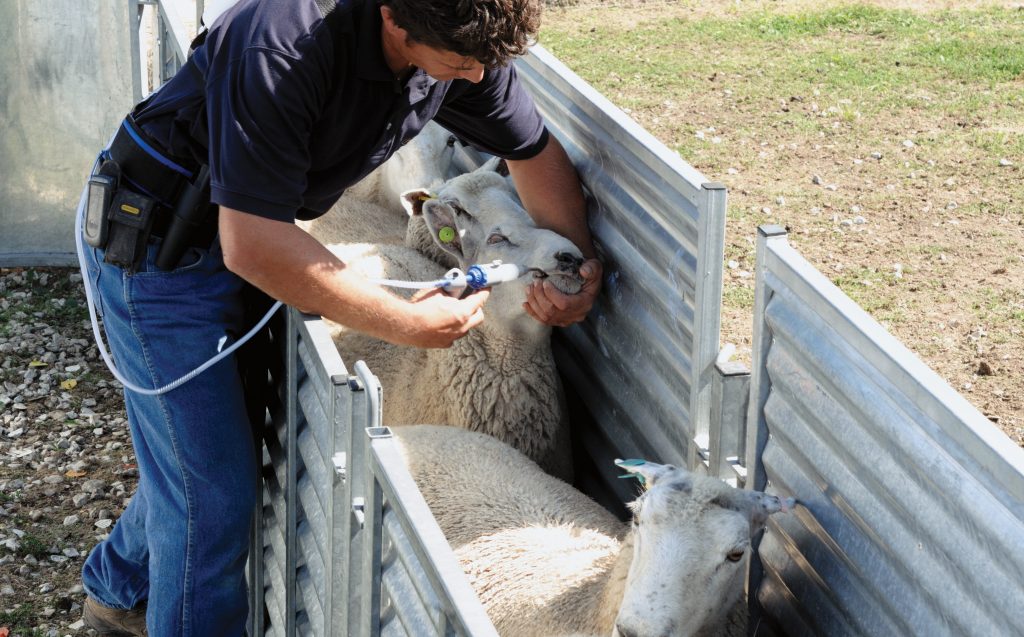Sheep Parasite Primer
By Dan Morrical, Ph.D.
As we consider the reasons that make raising sheep a challenge, internal parasites (worms) are right up there towards the top of the list. A few facts on parasites will help us realize how important a strategic attack is for combating these organisms. We need to realize that our pastures are not parasite larvae free. About twenty-five percent of the worm eggs shed last fall survived the winter and will hatch and develop into infective larvae. Under ideal conditions it takes 24 to 35 days from the time eggs are shed in the feces and deposited on the pasture until the larvae reach infective stage. Larvae also have enough nutrients that they can exist for one to two months in the infective stage. The warmer the weather the faster they use up their food source and perish. Lastly, some worms hibernate over winter in the sheep’s gut and become active egg layers in the spring. So ewes may have some worm load in the spring even though they have not consumed eggs for six months.
Other new facts on the parasite issue: Twenty percent of the ewes shed 80% of the eggs, so routinely treating the whole flock to treat 20% is not good use of anthelmintic and may lead to more rapid build up to resistance. Another new fact is that we generally do not want to rotate anthelmintics. The exception to this is if we need to control tape worms. Sheep maintained in drylot should not have to be de-wormed. Winter born lambs that are pushed hard and kept in confinement should not need to be dewormed.

When should you deworm?
- Just prior to, or at lambing. The hormonal changes associated with lambing sends a message to the internal parasites and they become active and start laying eggs. So it is good to remove this worm burden so that we minimize the stress on the ewes and all her consumed nutrients can go to making milk for feeding her lambs rather than to mount an immune response to fighting internal parasites.
- Just prior to pasture turnout. Dry ewes on good pasture may not need to be treated again the remainder of the grazing season.
Lactating ewes and young lambs are much more susceptible to internal parasites. Lactating ewes are more susceptible because their immune system is compromised by the high nutritional demands for lactation. Young lambs have not developed any resistance to internal parasites so they are at a huge risk. Additionally, young lambs are trying to grow so that they have a higher nutritional requirement. To improve the productivity of lactating ewes one needs to insure high quality feed from the pasture. This can be done by managing the plants so that they are vegetative and highly palatable resulting in maximum intake. Incorporating legumes also improves the nutritional status with more energy and protein dense forage. Another advantage legumes offer is increase productivity in the hot summer months. This matches the needs of the grazing flock because lambs start to compete with their dams for dry matter intake under short pasture condition. Some producers have successfully used self-fed soyhulls as a means of supplementing ewes and lambs on pasture. A self-feeder is better in that the risk of crushing small lambs with bunk feeding or abandonment of newborns if one to two pounds of grain is fed per day.
FAMACHA is patented system of comparing a standard eyeball pictures with varying degrees of anemia of the ewe or lamb. Only those animals which show symptoms of anemia are treated. The FAMACHA system requires lots of work as all sheep need to be caught and evaluated every two weeks. This system has been heavily implemented in areas of the country that are seeing resistance to anthelmintics. One needs to realize that FAMACHA only addresses haemonchous contortus (barber pole worm). This is the most prevalent parasite in Iowa. Because the haemonchous feeds on blood it does over time cause anemia that will end in death. Bottle jaw is an accumulation of fluids under the chin of severely infected sheep. Generally, haemonchous does not result in diarrhea and dirty butts on lambs.
The biggest mistake all producers make is assuming all thin sheep are wormy. For a true evaluation of the parasite load in the flock one needs to run fecal analysis. Your local veterinarian should be able to provide you with fecal egg counts. Generally, counts below 300 eggs per gram would not indicate the need for treatment.
Have a question about sheep or goats?
Thousands of producers all over the country use Premier 1 Supplies because of our well-trained staff and accurate, friendly answers. We want to help you succeed with your sheep operation.

